辽宁省抚顺县高中高中英语必修二《Unit3 Computers》学案
人教版高中英语必修2《Unit3Computers》教案
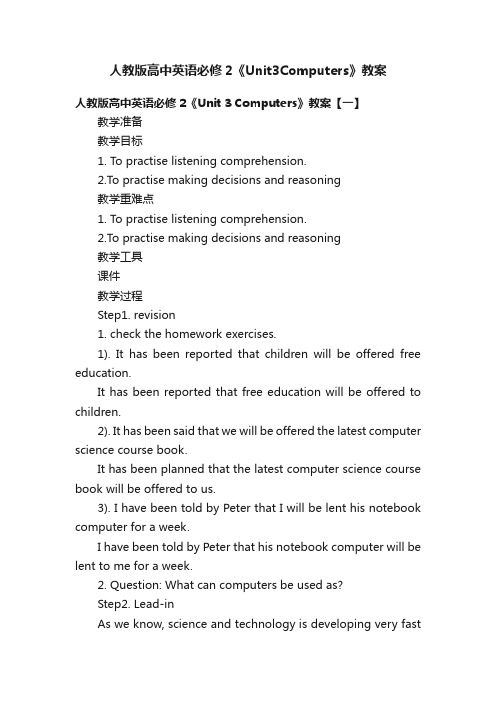
人教版高中英语必修2《Unit3Computers》教案人教版高中英语必修2《Unit 3 Computers》教案【一】教学准备教学目标1. To practise listening comprehension.2.To practise making decisions and reasoning教学重难点1. To practise listening comprehension.2.To practise making decisions and reasoning教学工具课件教学过程Step1. revision1. check the homework exercises.1). It has been reported that children will be offered free education.It has been reported that free education will be offered to children.2). It has been said that we will be offered the latest computer science course book.It has been planned that the latest computer science course book will be offered to us.3). I have been told by Peter that I will be lent his notebook computer for a week.I have been told by Peter that his notebook computer will be lent to me for a week.2. Question: What can computers be used as?Step2. Lead-inAs we know, science and technology is developing very fastand computers have become smaller and smaller. They have been used in many fields. So, the 21st century is the century of information technology What does it mean? Does information technology/ IT only mean things like computers? Of cause not. Actually, it means more than computers. Computers are just one kind of IT. What else do you know is part of IT?(TV, radio, CD-ROM, DVD, books……)Step3. Listening (SB)1. Pre-listening: What are the changes brought by different forms of IT ?What are the advantages and disadvantages of them ?2. While-listening:Go through the chart and make sure the students look at the chart before they listen to the tape. (This is to sharpen their attention and listen for the answers. This will also help them get the gist of the text.) Then Listen to the tape and finish filling in the chart. (If necessary, play the tape for several times.) Say: After listening to their talk, we know all kinds of IT have both disadvantages and advantages.Let’s check the answers together.Type of IT Advantages DisadvantagesTV You can both listen and watch. You cannot write to friends.Web You can find information. It is very expensive.Radio You can listen to English. You cannot watch a film.Book You can get information. Sometimes it is out of date.3. Post-listening:1) (pair work): decide which type of IT is best for you to use right now. Make your choice and give your reasons by using the following expressions.I think that….In my opinion, ….I believe that….I agree because….I disagree because….I’ve decided that….2) (group work): Discussion :Computers are useful and have brought us lots of good things, but they also cause bad effects. What attitude should we have towards the computer? (Make good use of it but never get trapped by it.)Step4. Speaking1. Pre-speakingSay: From what we have learn, we should admit that computers and the web have a great influence on the school education as well as people’s life. It has come into people’s everyday life and many families hold computers in their homes. Now there is a task for you.2. While-speaking1) Situation: You have been asked by your parents to help choose computers for your home. You and your friend have looked at several computers. Talk about the special things each computer can do. Make a decision about which kind of computer to buy and explain why.Information input: Show students some pictures of different computers (desktop computer & laptop computer & …) Language input: Useful expressions (Repeat it to strengthen students’ ability of use it.)Supporting an opinion Challenging an opinionI think that … , because … Perhaps, but what if / about …?First, … Have you thought about …?One reason is that … What makes you think that …?I think it is better because… I don’t like it because….(Pair work )Use the expressions to support your opinion or challenging other’s opinions.2) Oral report: (individual work )Do an oral report to your father and start your report like this: I looked at many different computers. The one I have chosen is the PEP personal computer. One of the main reasons is that it is suitable for homes. I found that…3. Post-speakingConclusion—What useful expression do we use to make a decision and reason?(In this way, they can review and use the words and phrases again.)Step6 Pre-writingSay: Imagine what problems and delights this android might have to deal with while it is serving you. Try yourself in someone else’s shoes is an important way of understanding how other people feel.Then discuss: You are an android. You work for a family with one child who is very spoiled. The parents want you to do everything for them. The parents are nice, but they often ask you to watch over their child. How do you feel? What would you do if the child asked you to do his/her homework for him/her? Would you ever tell the chi ld “no”?Step7 WritingSay: Write a passage about the result of your discussion! It should contain:What do you have to do?What is the child like?What is the parents’ requirement of the child?What do the parents want you to do?What does the child want you to do?Then what will you do? How do you feel?Sample writing:Hello everybody, my name is Liu Yan.I am a 321 model android.I work for the Li family. Mr and Mrs Li work very hard too.Mr Li is an architect and designs great tall apartment blocks.Mrs Li is a doctor and has to look after many patients.I remember all the plans for Mr Li's projects and can tell Mrs Li which drugs are the best to give any particular patient. And I also look after their library. I store all the books that they borrow from their school or friends in my brain.Of course my brain is as large as a mountain, so work like that is no trouble to me.I really eat books just like people eat food.The Lis have a child who is very spoiled. He needs me to remember all his school textbooks so that I can do his homework for him.He just gives me the information on the subject, what has to be done and the page numbers and I get on with it while he enjoys himself with his friends.Sometimes I don't think it is right to do his homework for him — it's somewhat cheating. However, his parents are very concerned at the pressure of work in school these days.The child has too much homework to do. They like him to go to the key school but they also want him to be able to have hobbies, learn to swim and keep fit! Poor child!So they consider me the most important person in the family after themselves.I am always introduced to their friends and play with visiting children.I am the perfect family academic aid and, although I was not cheap to buy, Mr Li says I was worth every yuan!Step8 AssessmentGet the students to assess their writing ability according to the following the questions:1. Is your composition well developed?2. Are your ideas well organized to the point?3. Do you have a good choice of words and idioms in your writing?4. Do you get a good mastery of complex structures of language?5. What kind of mistakes have you made in your writing?Step9: HomeworkWrite about your discussion. You may begin like this:Hello, everyone. My name is ___. I’m 321 m odel android. I work for the Li family….课后小结学了这节课,你有什么收获?课后习题完成课后习题一、二。
英语:必修2 unit3 computers-grammar(the passive voice)学案(新人教版】).doc
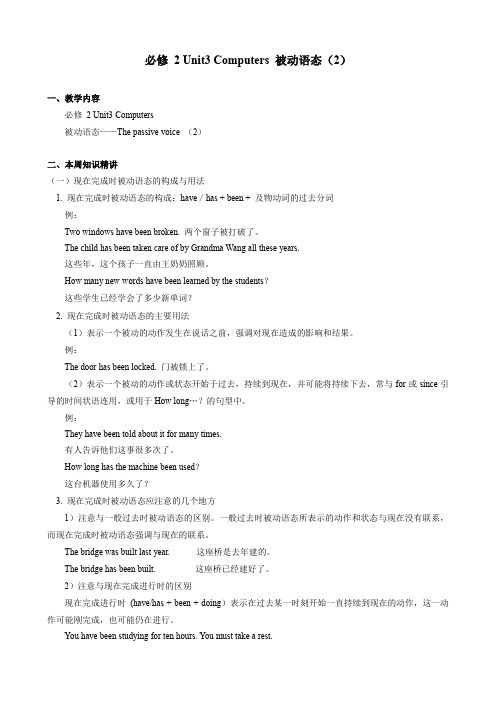
必修 2 Unit3 Computers 被动语态(2)一、教学内容必修2 Unit3 Computers被动语态——The passive voice (2)二、本周知识精讲(一)现在完成时被动语态的构成与用法1. 现在完成时被动语态的构成:have/has + been + 及物动词的过去分词例:Two windows have been broken. 两个窗子被打破了。
The child has been taken care of by Grandma Wang all these years.这些年,这个孩子一直由王奶奶照顾。
How many new words have been learned by the students?这些学生已经学会了多少新单词?2. 现在完成时被动语态的主要用法(1)表示一个被动的动作发生在说话之前,强调对现在造成的影响和结果。
例:The door has been locked. 门被锁上了。
(2)表示一个被动的动作或状态开始于过去,持续到现在,并可能将持续下去,常与for或since引导的时间状语连用,或用于How long…?的句型中。
例:They have been told about it for many times.有人告诉他们这事很多次了。
How long has the machine been used?这台机器使用多久了?3. 现在完成时被动语态应注意的几个地方1)注意与一般过去时被动语态的区别。
一般过去时被动语态所表示的动作和状态与现在没有联系,而现在完成时被动语态强调与现在的联系。
The bridge was built last year. 这座桥是去年建的。
The bridge has been built. 这座桥已经建好了。
2)注意与现在完成进行时的区别现在完成进行时(have/has + been + doing)表示在过去某一时刻开始一直持续到现在的动作,这一动作可能刚完成,也可能仍在进行。
高级中学高中英语(人教版)必修二学案:Unit 3 Computers3
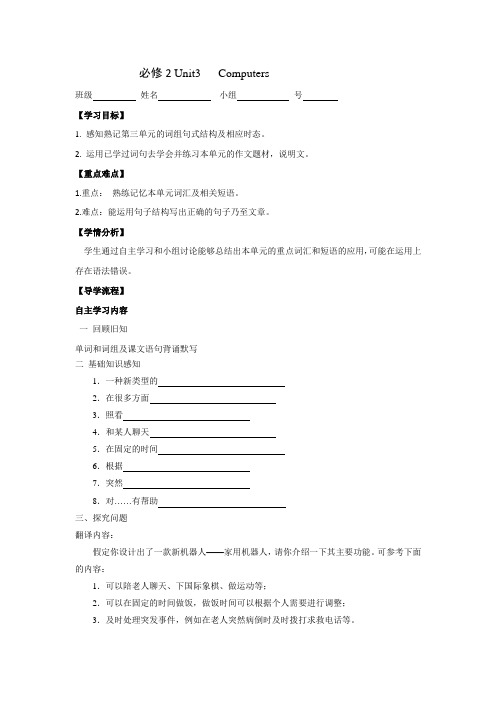
必修2Unit3 Computers班级姓名小组号【学习目标】1.感知熟记第三单元的词组句式结构及相应时态。
2. 运用已学过词句去学会并练习本单元的作文题材,说明文。
【重点难点】1.重点:熟练记忆本单元词汇及相关短语。
2.难点:能运用句子结构写出正确的句子乃至文章。
【学情分析】学生通过自主学习和小组讨论能够总结出本单元的重点词汇和短语的应用,可能在运用上存在语法错误。
【导学流程】自主学习内容一回顾旧知单词和词组及课文语句背诵默写二基础知识感知1.一种新类型的2.在很多方面3.照看4.和某人聊天5.在固定的时间6.根据7.突然8.对……有帮助三、探究问题翻译内容:假定你设计出了一款新机器人——家用机器人,请你介绍一下其主要功能。
可参考下面的内容:1.可以陪老人聊天、下国际象棋、做运动等;2.可以在固定的时间做饭,做饭时间可以根据个人需要进行调整;3.及时处理突发事件,例如在老人突然病倒时及时拨打求救电话等。
四、基础知识拓展与迁移:[黄金表达]1.描述一件物品常用的句式①I would like to have a(n) ... that can ...②It should also ...③I hope my android will ...2.说明文常用的过渡词(1)表示语境逻辑顺序的then, now, soon, afterwards, later ...(2)表示语意顺序的first, second, firstly, secondly, first of all, next, at first, at last ...请及时记录自主学习过程中的疑难:小组讨论问题预设:谋篇布局1.体裁:2.话题:3.时态:4.人称:5.结构⎩⎪⎨⎪⎧ 第一段:引出话题——一款新型机器人第二、三、四段:功能和作用第五段:总结提问展示问题预设:各组翻译句子 1.这里是一款新型机器人——家用机器人,它能在很多方面帮助我们。
高级中学高中英语(人教版)必修二学案:Unit 3 Computers教学案
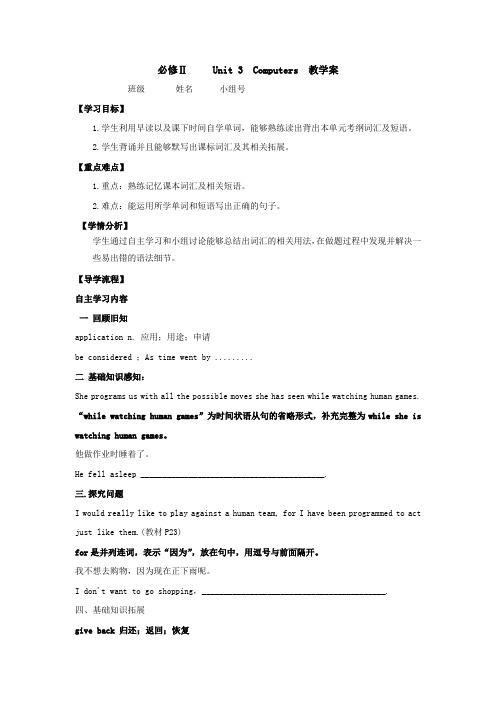
必修Ⅱ Unit 3 Computers 教学案班级姓名小组号【学习目标】1.学生利用早读以及课下时间自学单词,能够熟练读出背出本单元考纲词汇及短语。
2.学生背诵并且能够默写出课标词汇及其相关拓展。
【重点难点】1.重点:熟练记忆课本词汇及相关短语。
2.难点:能运用所学单词和短语写出正确的句子。
【学情分析】学生通过自主学习和小组讨论能够总结出词汇的相关用法,在做题过程中发现并解决一些易出错的语法细节。
【导学流程】自主学习内容一回顾旧知application n. 应用;用途;申请be considered ;As time went by .........二基础知识感知:She programs us with all the possible moves she has seen while watching human games. “while watching human games”为时间状语从句的省略形式,补充完整为while she is watching human games。
他做作业时睡着了。
He fell asleep __________________________________________.三.探究问题I would really like to play against a human team, for I have been programmed to act just like them.(教材P23)for是并列连词,表示“因为”,放在句中,用逗号与前面隔开。
我不想去购物,因为现在正下雨呢。
I don't want to go shopping,__________________________________________.四、基础知识拓展give back 归还;返回;恢复give away 捐赠;赠送;分送;颁发;泄露;暴露give in 呈交;屈服;让步give out 分发;耗尽;公布,宣布;发出(光、热或信号)give up 放弃;投降give way to 让……先行;被……代替与迁移:请及时记录自主学习过程中的疑难:小组讨论问题预设:(1)in a way=in one way在某种程度上(2)相关短语:in the/one's way 妨碍;挡道in this/that way 用这种/那种方式in no way 绝不on the/one's way 在路上;即将到来by the way 顺便说/问一下①The rainy weather helped me in___________way, which gave me a good excuse to refuse to go to this party or that.②There was a big truck in___________ way.提问展示问题预设:课文中的知识点及重难点词汇短语课堂训练问题预设:①The headmaster____________________the prizes at the school sports day.校长在校运动会那天颁发了奖项。
高级中学高中英语(人教版)必修二:Unit 3 Computers 导学案2
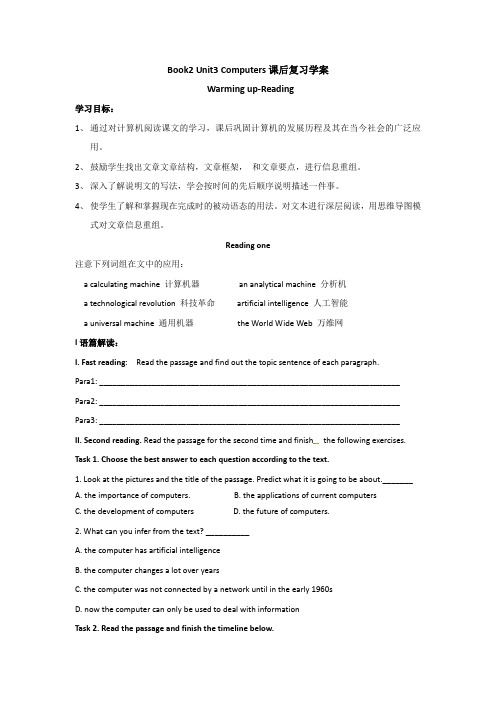
Book2 Unit3 Computers课后复习学案Warming up-Reading学习目标:1、通过对计算机阅读课文的学习,课后巩固计算机的发展历程及其在当今社会的广泛应用。
2、鼓励学生找出文章文章结构,文章框架,和文章要点,进行信息重组。
3、深入了解说明文的写法,学会按时间的先后顺序说明描述一件事。
4、使学生了解和掌握现在完成时的被动语态的用法。
对文本进行深层阅读,用思维导图模式对文章信息重组。
Reading one注意下列词组在文中的应用:a calculating machine 计算机器an analytical machine 分析机a technological revolution 科技革命artificial intelligence 人工智能a universal machine 通用机器the World Wide Web 万维网I语篇解读:I. Fast reading: Read the passage and find out the topic sentence of each paragraph.Para1: _____________________________________________________________________ Para2: _____________________________________________________________________ Para3: _____________________________________________________________________II. Second reading. Read the passage for the second time and finish the following exercises. Task 1. Choose the best answer to each question according to the text.1. Look at the pictures and the title of the passage. Predict what it is going to be about._______A. the importance of computers.B. the applications of current computersC. the development of computersD. the future of computers.2. What can you infer from the text? __________A. the computer has artificial intelligenceB. the computer changes a lot over yearsC. the computer was not connected by a network until in the early 1960sD. now the computer can only be used to deal with informationTask 2. Read the passage and finish the timeline below.1642: Computers began as a ____________ machine in _____________.1822: The ___________ machine was made by Charles Babbage.1936: Computers grew rapidly both in ____________ and in ___________.1940s: A computer grew as large as a _____________.1960s: The first ____________ of computers was connected to each other.1970s: Computers were used in _____________ and in ______________.Now:Computers connect people all over the ____________.III.Analyze some important sentences and translate them.1.①Over time I have been changed quite a lot.②Over time my memory has developed so much that, like an elephant, I never forgetanything I have been told!③I have been put into robots and used to make mobile phones as well as help with medical operations.此三句中都包含了一个共同的时态是_____________________,它的基本结构是___________________1.④I developed very slowly and it took nearly two hundred years before I was built as ananalytical machine by Charles Babbage.⑤At that time it was considered a technological revolution and the start of my “artificial intelligence”.认为某人/某物…____________________________________⑥From then on, I grew rapidly both in size and in brainpower.⑦But I was always so lonely standing there by myself, until in the early 1960s they gave me a family connected by a network.standing there by myself在句中作__________________ connected by a network在句中作_____________⑧I was able to share my knowledge with others through the World Wide Web.⑨Anyhow, my goal is to provide humans with a life of high quality.⑩. I am now truly filled with happiness that I am a devoted friend and helper of the humanrace!IV. Find out the following phrases in the passage and try to recite them.1.有共同之处_________________________2. 把…和…相比____________________3. 经过一段时间_______________________4. 从那时起______________________5. 随着时间的推移_____________________6. 结果__________________________7. 如此…以至于… _____________________ 8. 独自地,单独地__________________9. 与…分享…_________________________ 10. 和,也_____________________11. 为某人提供某物_____________________ 12. 高质量的生活___________________ 13. 充满_________________________VReading one拓展提升学案Read the whole passage and fill in the blanks.Over time I have been changed quite a lot. I began as a(n ) ______ machine in 1642 in France. Then in 1822 I was built as a(n) ______ machine. My real father, Alan Turing, built a(n) “______ machine” to solve any ______ problem in 1936. Since I was huge at that time, people thought I was ______. As the years have ______ by, I have been made smaller and smaller.There were times when my size was _______ changed. I became smaller and thinner but I got cleverer and cleverer. In the early 1960s, I was given a family _______ by a network. Since I was brought into people’s homes, my family and I have been used to _______with information and communication each other around the world. I have ______ been built to serve the human race since my birth.。
高中英语必修二Unit 3 Computers阅读课的教学设计方案
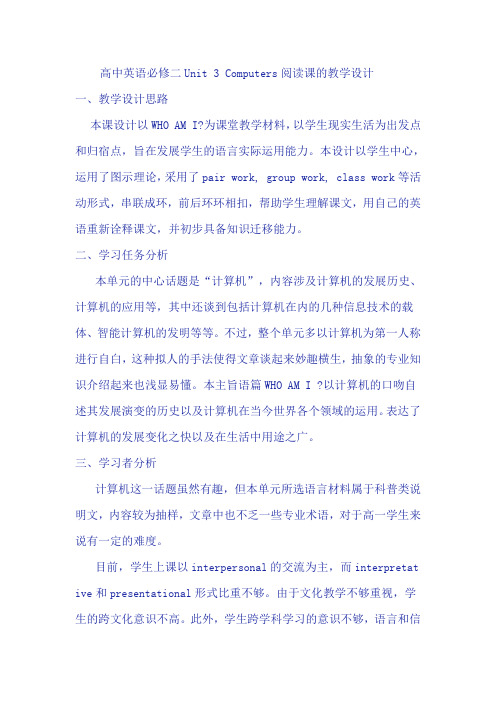
高中英语必修二Unit 3 Computers阅读课的教学设计一、教学设计思路本课设计以WHO AM I?为课堂教学材料,以学生现实生活为出发点和归宿点,旨在发展学生的语言实际运用能力。
本设计以学生中心,运用了图示理论,采用了pair work, group work, class work等活动形式,串联成环,前后环环相扣,帮助学生理解课文,用自己的英语重新诠释课文,并初步具备知识迁移能力。
二、学习任务分析本单元的中心话题是“计算机”,内容涉及计算机的发展历史、计算机的应用等,其中还谈到包括计算机在内的几种信息技术的载体、智能计算机的发明等等。
不过,整个单元多以计算机为第一人称进行自白,这种拟人的手法使得文章谈起来妙趣横生,抽象的专业知识介绍起来也浅显易懂。
本主旨语篇WHO AM I ?以计算机的口吻自述其发展演变的历史以及计算机在当今世界各个领域的运用。
表达了计算机的发展变化之快以及在生活中用途之广。
三、学习者分析计算机这一话题虽然有趣,但本单元所选语言材料属于科普类说明文,内容较为抽样,文章中也不乏一些专业术语,对于高一学生来说有一定的难度。
目前,学生上课以interpersonal的交流为主,而interpretat ive和presentational形式比重不够。
由于文化教学不够重视,学生的跨文化意识不高。
此外,学生跨学科学习的意识不够,语言和信息的双向促进关系的认识不够。
对于比较策略主要运用在英汉汉英互译的语言层面,未进入文化比较和思维比较。
学生的课外语言活动环境不够丰富和重视程度不够,通常以词汇、语法和写作练习为主,缺乏真实的语言运用。
四、教学目标(1) Language Skills:1. Use “decision making” expressions like “I believe... in my opinion, etc” correctly.(activity 1)2. Develop their predicting and reorganizing skills.(activ ity 2,3,4,6)3. Write an 100-word passage on “My Robot Friend----Alice”(Task)(2) Language Knowledge:1. Reorganize and share their backgroud information of comp uters.(activity 1)2. Find and retell the grammar structure of the Present Perfe ct Passive Voice. (activity 5)(3) Emotions and Attitudes1. 通过讨论,能归纳和陈述网络给学校带来的影响;2. 通过辩论,能对外来网络充满好奇,激发自己的创造力的同时形成健康的网络使用态度和习惯。
unit 3 《computers》学案 (人教版必修2)
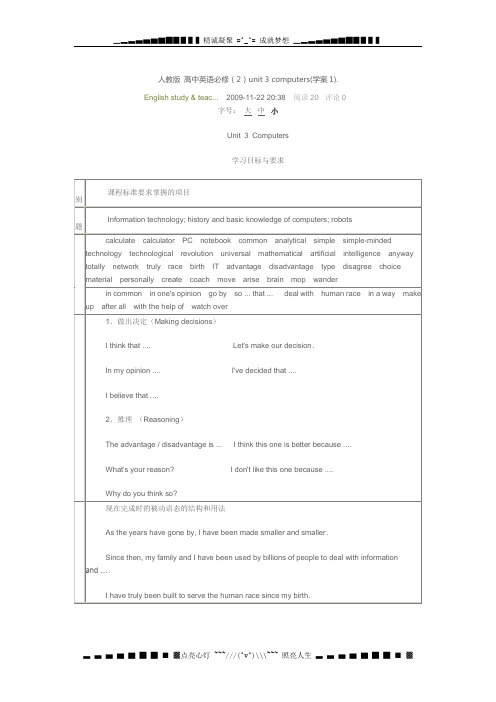
人教版高中英语必修(2)unit 3 computers(学案1).English study & teac... 2009-11-22 20:38 阅读20 评论0字号:大中小Unit 3 Computers学习目标与要求Scanning:TimelineGo through the text quickly to find some information and fill in the form.So in which order is the text organized? (time order)True or False:1. Alan Turing built an Analytical Machine to solve any mathematical problems.2. People began to realize that the computer got cleverer and quicker with time passing.3. The computer began to serve the human race since it was brought into people’s homes.4. Since the 1970s, the computer was used by people around the world through the Internet.5. The larger the computer is, the more memory it has.(F T F T F)Step3 ComprehendingTask 1. Choose the best answers according to the text:1. What’s the main idea of the text? (D)A. The computer wants to find “who he is”.B. The functional change of the computer.C. The computer becomes popular around the world.D. The history of the computer.2. What can you infer from the text? (B)A. The computer has artificial intelligence.B. The computer changes a lot over the years.C. The computer was not connected by a network until in the early 1960s.D. Now the computer can only be used to deal with information.。
【人教版】高中英语必修二:学案全套Unit 3 Computers学案(教师版)(精修版)
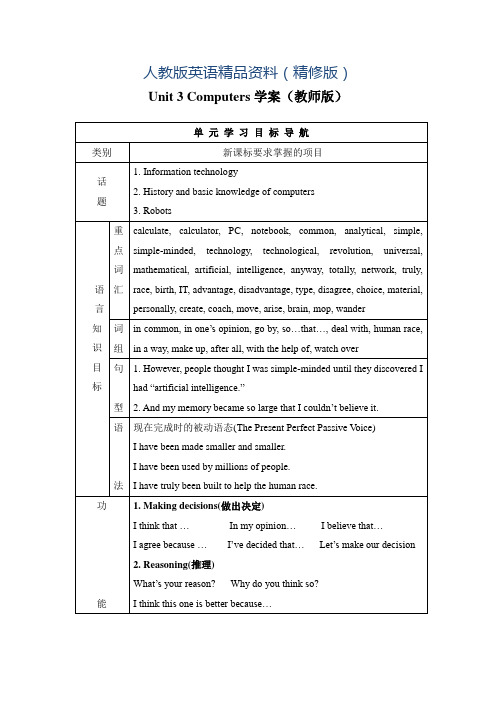
人教版英语精品资料(精修版)Unit 3 Computers学案(教师版)(一)掌握本单元的重点单词和短语。
(二)了解计算机和机器人的历史和基本知识。
(三)语法:现在完成时的被动语态。
(四)学会做决定和推理的基本语言。
通过自主探究,小组合作,巩固词汇,增强阅读能力,了解计算机、机器人等现代科技。
一.写出下列词汇:1.算盘abacus2.简化simplify3.合逻辑的logical4.人造的artificial5.私人的personal6.应用application7.计算calculate8.探索explore9.技术technology 10.智力intelligence 11.总的tolal12.电子的electronic二.找出以下短语:1)和…有共同点have sth in common 2)把…和…比较compare…with…3)根据according to 4)计算出,解决work out (figure out)5)把…按顺序排列put …in an order6)听起来简单sound simple7)作为…的开始begin as 8)在那时at that time9)解决问题solve problems 10)随着时间的推移as time goes by11)结果as a result 12)与…连接connected by13) 和…分享share sth with sb 14) 和,而且as well as15)提供给某人某物provide sb with sth 16) 充满be filled with17) 一种高质量的生活a life of high quality18)一个忠诚的朋友a devoted friend19)从……起from…on20)在……的帮助下with the help of21)处理,对付deal with 22) 看守,监视watch over三.翻译句子1. I begin as a calculating machine in France in 1642.1642年我在法国诞生时是一台计算器。
高中英语必修二Unit3ComputersReading导学案

高中英语必修二Unit 3 Computers------ Reading导学案预习案1. key words1.计算vt. _____________2. Simplify________3.solve ________4. intelligence__________5.事实; 现实n. ________6. explore_______________7. application ____________8. finance ___________9.不管怎样__________ 10. 人类_______________ 2. key Phrases1. from then on ___________2. as a result _______________3.作为……工作_____________4. go by ____________5. so…that _____________6._______________和;也;既……又……7. _______ sth. with sb.与某人分享某物8.be of high quality ________________3. patterns1.As time went by,I was made smaller.(P18)2.I developed very slowly and It took nearly two hundred years before I was built as an analytical machine by Charles Babbage.(P18)3. Over time my memory has developed so much that,like an elephant, I never forget any thing I have been told!(P18)探究案Step1. Scanning:1. Who am I?______________________2. what is the main of this passage?A. The birth of computers.B. The development and use of computers.C. A machine which is simple-minded.D. Computers may replace human beings.Step2: Reading Comprehension (Match the main ideas and the paragraphs) Para 1 These changes only became possible as my memory improved.Para 2 Since the 1970s many new applications have been found for me.Para 3 Over time I have been changed quite a lot.Step3. : SkimmingName : computer Born : (time)_______ (place) __________ My real father: ____________ My size: 1. huge ( in the past) 2. __________________(in the modern time )My history: 1.1642___________machine 2. 1822 analytical machine3. 1936 __________machine4. 1940s huge computers5. 1970s PC and ______ My memory: stored in _____ ,transistors,______My applications: communication; ________; ______; _______;mobile phone; medical operation; _____________...Step4. Discussion:As a student, how to make good use of a computer?You can Use these reasoning expressions in your discussion:In my opinion/ view, /personally……As for me……I think / don’t think that …. As/so far as I am concerned ……We can use computer to……Have some good/bad effects on……Step5:Homework:1. Write a passage about how to make good use of a computer .2. Prepare for the next period.。
人教版高中英语必修2《Unit 3 Computers》教案2篇
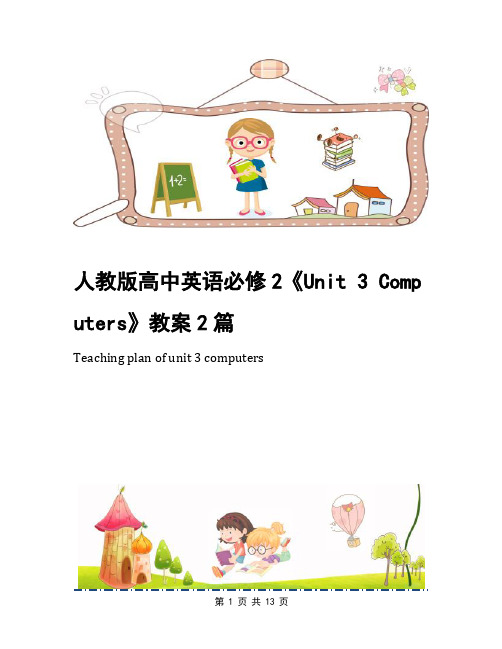
人教版高中英语必修2《Unit 3 Comp uters》教案2篇Teaching plan of unit 3 computers人教版高中英语必修2《Unit 3 Computers》教案2篇前言:英语作为在许多国际组织或者会议上都是必需语言,几乎所有学校选择英语作为其主要或唯一的外语必修课。
英语教学涉及多种专业理论知识,包括语言学、第二语言习得、词汇学、句法学、文体学、语料库理论、认知心理学等内容。
本教案根据英语课程标准的要求和教学对象的特点,将教学诸要素有序安排,确定合适的教学方案的设想和计划、并以启迪发展学生智力为根本目的。
便于学习和使用,本文档下载后内容可按需编辑修改及打印。
本文简要目录如下:【下载该文档后使用Word打开,按住键盘Ctrl键且鼠标单击目录内容即可跳转到对应篇章】1、篇章1:人教版高中英语必修2《Unit 3 Computers》教案2、篇章2:人教版高中英语必修2《Unit 3 Computers》教案篇章1:人教版高中英语必修2《Unit 3 Computers》教案教学准备教学目标1.To practise listening comprehension.2.To practise making decisions and reasoning教学重难点1.To practise listening comprehension.2.To practise making decisions and reasoning教学工具课件教学过程Step1.revision1.check the homework exercises.1). It has been reported that children will be offered free education.It has been reported that free education will be offered to children.2). It has been said that we will be offered the latest computer science course book.It has been planned that the latest computer science course book will be offered to us.3). I have been told by Peter that I will be lent his notebook computer for a week.I have been told by Peter that his notebook computer will be lent to me for a week.2.Question: What can computers be used as?Step2.Lead-inAs we know, science and technology is developing very fast and computers have become smaller and smaller. They have been used in many fields. So, the 21st century is the century of information technology What does it mean? Does information technology/ IT only mean things like computers? Of cause not. Actually, it means more than computers. Computers are just one kind of IT. What else do you know is part of IT?(TV, radio, CD-ROM, DVD, books……)Step3.Listening (SB)1.Pre-listening: What are the changes brought by different forms of IT ?What are the advantages and disadvantages ofthem ?2.While-listening:Go through the chart and make sure the students look at the chart before they listen to the tape. (This is to sharpen their attention and listen for the answers. This will also help them get the gist of the text.) Then Listen to the tape and finish filling in the chart. (If necessary, play the tape for several times.)Say: After listening to their talk, we know all kinds of IT have both disadvantages andadvantages.Let’s check the answers together.Type of IT Advantages DisadvantagesTV You can both listen and watch. You cannotwrite to friends.Web You can find information. It is very expensive.Radio You can listen to English. You cannot watch a film.Book You can get information. Sometimes it is out of date.3.Post-listening:1)(pair work): decide which type of IT is best for you to use right now. Make your choice and give your reasons by using the following expressions.I think that….In my opinion, ….I believe that….I agree because….I dis agree because….I’ve decided that….2)(group work): Discussion :Computers are useful and have brought us lots of good things, but they also cause bad effects. What attitude should we have towards the computer? (Make good use of it but never get trapped by it.)Step4.Speaking1.Pre-speakingSay: From what we have learn, we should admitthat computers and the web have a great influence on the school education as well as people’s life. It has come into people’s everyday life and many families hold computers in their homes. Now there is a task for you.2.While-speaking1) Situation: You have been asked by your parents to help choose computers for your home. You and your friend have looked at several computers. Talk about the special things each computer can do. Make a decision about which kind of computer to buy and explain why.Information input: Show students some pictures of different computers (desktop computer 特点______________4.科技;工艺 _______________5.目标,目的 n. ______________6.出现;发生vi. ______________7.解决;解答vt. _______________8.类型,打字 v.信号._________10.无论如何,即使如此adv. ______二.写出下列单词的变化形式1.operator n. 操作员; 接线员→_____________v. 操作; 经营→____________n. 操作; 经营2.technology n.工艺; 科技; 技术→_______________ adj. 科技的3.intelligence n.智力; 聪明; 智能→_________adj.智能的; 聪明的4.appearance n. 外观; 外貌; 出现→________________vi. 出现5.application n. 应用; 用途; 申请→_______________v. 应用; 申请→___________n. 申请人; 求职者6.explore vt. 探测→___________n. 探险家; 勘探者→_____________ n. 探索7.personal adj. 私人的; 个人的;→________adv. 就个人而言; 亲自→_________n. 个性; 人格;三、用所给词的适当形式填空(1)Can you say dolphins are much more ____________than other animals?Well, they are animals of high _____________. (intelligent)(2) She expressed her _________ opinion yesterday. ____________ speaking, I agreed with what she said. (personal)(3) Any ___________ who would like to_____________ to become anassistant in our company should send us an___________ .(apply)四、语境助记——词不离句,句不离段With the electronic technology revolution going on,simplified calculation is solved in the application on finance by universal exploration. Our goal of making life happier is certain to be realized through man's intelligence.五、翻译下列必背短语?1.在某种程度上_______________2.依…看;据…认为_____________3.从…时候起 _______________4.结果 _______________5.处理;安排;对付 ____________6.弥补,补足;整理,编造_________7.毕竟_______________?8.看守,监视 _______________9.在……帮助下_______________?六.根据句子意思写出单词的正确形式。
高中英语必修2Unit3Computers导学案
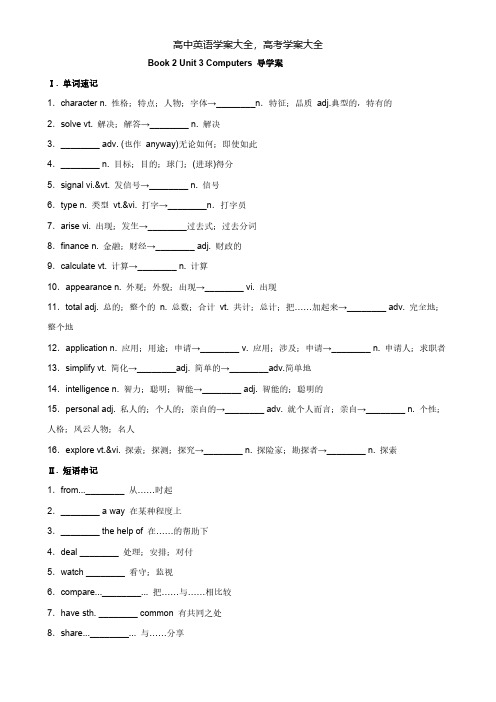
Book 2 Unit 3 Computers 导学案Ⅰ. 单词速记1.character n. 性格;特点;人物;字体→________n.特征;品质adj.典型的,特有的2.solve vt. 解决;解答→________ n. 解决3.________ adv. (也作anyway)无论如何;即使如此4.________ n. 目标;目的;球门;(进球)得分5.signal vi.&vt. 发信号→________ n. 信号6.type n. 类型vt.&vi. 打字→________n.打字员7.arise vi. 出现;发生→________过去式;过去分词8.finance n. 金融;财经→________ adj. 财政的9.calculate vt. 计算→________ n. 计算10.appearance n. 外观;外貌;出现→________ vi. 出现11.total adj. 总的;整个的n. 总数;合计vt. 共计;总计;把……加起来→________ adv. 完全地;整个地12.application n. 应用;用途;申请→________ v. 应用;涉及;申请→________ n. 申请人;求职者13.simplify vt. 简化→________adj. 简单的→________adv.简单地14.intelligence n. 智力;聪明;智能→________ adj. 智能的;聪明的15.personal adj. 私人的;个人的;亲自的→________ adv. 就个人而言;亲自→________ n. 个性;人格;风云人物;名人16.explore vt.&vi. 探索;探测;探究→________ n. 探险家;勘探者→________ n. 探索Ⅱ. 短语串记1.from...________ 从……时起2.________ a way 在某种程度上3.________ the help of 在……的帮助下4.deal ________ 处理;安排;对付5.watch ________ 看守;监视6.compare...________... 把……与……相比较7.have sth. ________ common 有共同之处8.share...________... 与……分享9.________ a result 结果10.make ________ 弥补;编造;打扮;构成11.________ all 毕竟;终究12.give ________ 捐献;泄露13.________ one's own 属于某人自己的14.go ________ 时光流逝15.provide sth. ________ sb. 为某人提供某物way 相关短语①________ a way 从某一角度看;在某种程度上②all ________ way 一路上;自始至终;完全③________ the way 顺便说一下④________ no way 决不(位于句首,句子应使用倒装)⑤________ this way 用这种方法⑥________ the way 挡道;碍事⑦________ the way 在途中⑧________ way! [俚]别想!没门!make 相关短语①make ________ 虚构;弥补;组成;化妆;和好②be made up ________ 由……组成(=consist of)③make up ________ 偿还;赔偿,弥补④make ________ 走向;有利于;冲向⑤make ________ 辨认出;填写;理解Ⅲ. 重点句式重温1.before 引导时间状语从句,“……之后才……”I developed very slowly and it took nearly two hundred years before I was built as an analytical machine by Charles Babbage.【仿写】不久公交车就来了。
高中英语必修2 Unit 3 Computers period 1 教案 精品
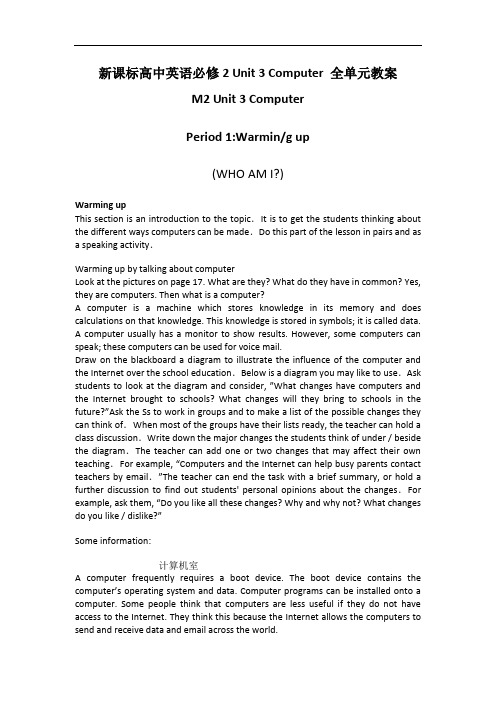
新课标高中英语必修2 Unit 3 Computer 全单元教案M2 Unit 3 ComputerPeriod 1:Warmin/g up(WHO AM I?)Warming upThis section is an introduction to the topic.It is to get the students thinking about the different ways computers can be made.Do this part of the lesson in pairs and as a speaking activity.Warming up by talking about computerLook at the pictures on page 17. What are they? What do they have in common? Yes, they are computers. Then what is a computer?A computer is a machine which stores knowledge in its memory and does calculations on that knowledge. This knowledge is stored in symbols; it is called data.A computer usually has a monitor to show results. However, some computers can speak; these computers can be used for voice mail.Draw on the blackboard a diagram to illustrate the influence of the computer and the Internet over the school education.Below is a diagram you may like to use.Ask students to look at the diagram and consider, ”What changes have computers and the Internet brought to schools? What changes will they bring to schools in the future?”Ask the Ss to work in groups and to make a list of the possible changes they can think of.When most of the groups have their lists ready, the teacher can hold a class discussion.Write down the major changes the students think of under / beside the diagram.The teacher can add one or two changes that may affect their own teaching.For example, “Computers and the Internet can help busy parents contact teachers by email.”The teacher can end the task with a brief s ummary, or hold a further discussion to find out students' personal opinions about the changes.For example, ask them, “Do you like all these changes? Why and why not? What changes do you like / dislike?”Some information:计算机室A computer frequently requires a boot device. The boot device contains the computer’s operating system and data. Computer programs can be installed onto a computer. Some people think that computers are less useful if they do not have access to the Internet. They think this because the Internet allows the computers to send and receive data and email across the world.曙光3000巨型计算机A computer is now almost always an electronic device. It usually contains materials which are toxic; these materials will become toxic waste when disposed of. When a new computer is purchased in some places, laws require that the cost of its waste management must also be paid for. This is called product stewardship.In some countries old computers are recycled (melted down) to get gold and other metals. This is dangerous, because this procedure releases the toxic waste into the water and soil.Computers become obsolete quickly. Very often they are given away and new ones replace them within two or three years. This makes the problem worse. Computer recycling is thus common. Many projects try to send working computers to developing nations so they can be re-used and will not become waste as quickly. Computer jargon 计算机行话Computer jargon means words to do with computers and surrounding topics. Knowing what these words mean can help you know more about computers. Some people use these words to impress other people (Also known as buzzwords). Examples of jargon:Bit - The smallest data unit, can either be a “0.” or a “1.”.Byte - unit of data. See also Kilobyte, Megabyte, Gigabyte and NibbleCPU –Central Processing Unit, Another name for processorData - Information stored on a computerDisk - A place to store data.Email - Electronic mail.GHz - Gigahertz. Used often incorrectly to describe the speed of a processor. But with some 2.4 GHz processors faster than 3.6 GHz ones, it is clear that it is just a salesman trick.Load - Get data from a diskNibble - Half a ByteSave - Put data on a diskRAM – random-access memory(随机存取存储器), the more the better.USB - Universal Serial Bus(通用串行总线,一种简化了插接多种附件的薄型插座)WWW - World Wide Web, part of the InternetPeriod2-3 Pre-reading & ReadingPre-readingThis can be a continuation of the Warming Up.Let the students discuss the questions set out in the Student's Book.1. Questioning and answering What do you know about computer?●Electronic machine capable of performing calculations and other manipulations of various types of data, under the control of a stored set of instructions. The machine itself is the hardware; the instructions are the program or software. Depending upon size, computers are called mainframes, minicomputers, and microcomputers. Microcomputers include desk-top and portable personal computers.●A multi-function electronic device that can execute instructions to perform a task.●A device that accepts information, processes it, and supplies an output. A computer usually contains memory, a control unit, arithmetic and logical units, and a means for input and output.●a programmable har dware component that is controlled by internally stored programs and that can perform substantial computations (including arithmetic and logic operations) without human intervention. A computer typically consists of one or more processing units, memory units, and associated peripheral input and output devices.●Related to automation and electronic data processing. The Library of Congress commonly classes most computer-related books in HF5548, QA75-76, Z52, T385, and some TK ranges.●a machine for performi ng calculations automaticallycalculator: an expert at calculation (or at operating calculating machines)●A computer is a device or machine for making calculations or controlling operations that are expressible in numerical or logical terms. Computers are constructed from components that perform simple well-defined functions. The complex interactions of these components endow computers with the ability to process information. If correctly configured (usually by, programming) a computer can be made to represent some aspect of a problem or part of a system. If a computer configured in this way is give2. Discussing and sharing How have computers changed our lives?Someday soon, if you haven’t already, you’re likely to plug into the computer network nation growing in our midst. Computer terminals, or small computers connected via modem (a modulator/demodulator circuit for encoding/decoding computer chatter) to ordinary telephone lines, should be as ubiquitous as the telephone itself. They’re a much more use ful and humane tool than the phone, and with corporate America behind them the networks will be everywhere----changing our lives more than any technology since the automobile.Joining a computer network is the same as joining a community. Small systems are like villages, where new members are formally welcomed. The larger networks, the Source and CompuServe, for example, are cities-anonymous, full of life and events, but difficult to fit into.II. ReadingThis is the purpose of the reading and so it is important that the students learn to use all the clues in the text to help them understand the gist of what they are reading.So encourage them to look at the pictures and the heading and guess what the text might be about.Then ask the class to read the passage silently.Make sure the students have the chronology of the development of computers in their minds.Ask them:1. Listening and reading to the recording of the text WHO AM I?Turn to page 18 and listen and read to the recording of the text. Pay attention to the pauses, pronunciation and intonation of the native reader.2. Reading aloud and underlining expressionsNow we are to read the text once again and underline all the expressions in the text. Put them down into your notebook after class as homework.Collocations from WHO AM I?begin as…, a calculating machine, be built as…, follow instructions from…, sound simple, at the time, a technological revolution, write a book, make…work, solve problems, become huge, had artificial intelligence, go back t o…, the size of…, go by, change size, become small and thin, get quick, stand there by oneself, be connected by…, share information by…, talk to…, bring…into…, deal with…, communicate with…, serve the human race3. Reading, identifying and settlingAttention, please! It is time to skim the text one more time and identify the difficult sentences. Try analyzing the structures of the difficult sentences and discuss them among your group members. You may also put your questions to me for help.Chat (online)(在线)聊天To chat is to talk about ordinary things that are not very important. You can chat to one person or to many people. People also use this word now for parts of the Internet where we can talk with many different people at the same time. Usually, you chat on the internet in a chat room or messaging service like AOL(American On-Line) Instant Messenger (AIM), Yahoo Messenger, or MSN Messenger.IV. Closing down by doing comprehending exercisesTurn to page 18 and in pairs do the comprehending exercises No. 1 and 2. Reading and transferringScan the text for information to complete the table below, describing the development of computer.In 1642In 1822In 1936In 1960sIn 1970sAnswer key:1642: The computer began as a calculating machine.1822: The Analytical Machine was made by Charles Babbage.1936: Alan Turing wrote a book to describe how computers could be made to work.1960s: Computers had new transistors and became smaller.1960s: The first family of computers connected to each other.1970s: Computers were brought into people's homes.Now: Computers connect people all over the world togetherV. Explanation1.in common: for or by all of a group 共同的;共有的;共用的。
(人教版)必修二-Unit3-computers-学案
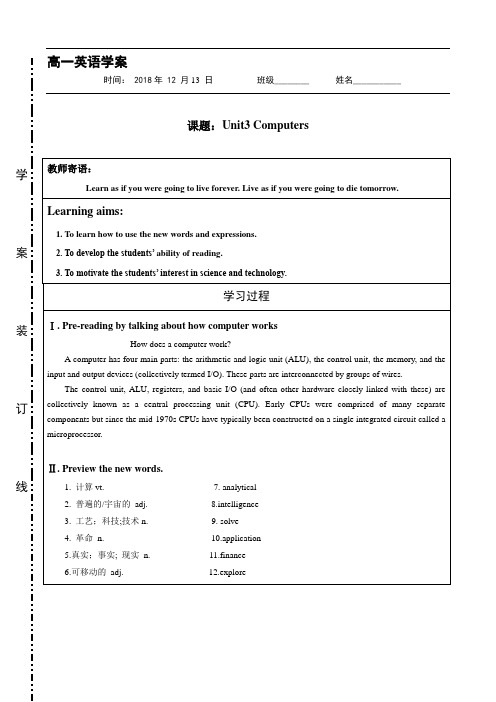
高一英语学案
时间: 2018 年 12 月 13 日 班级________ 姓名___________
课题:Unit3 Computers
学
教师寄语:
Learn as if you were going to live forever. Live as if you were going tos:
1. To learn how to use the new words and expressions.
案
2. To develop the students’ ability of reading. 3. To motivate the students’ interest in science and technology.
2. What was the computer called in 1936?
3. What happened to the computer in the 1970s?
4. Look at these inventions. Can you put them in an order according to the time when they appeared? ( ( ) analytical machine ) robot ( ( ) laptop ) PC ( ( ) calculating machine ) universal machine
学习过程
装
Ⅰ. Pre-reading by talking about how computer works
How does a computer work? A computer has four main parts: the arithmetic and logic unit (ALU), the control unit, the memory, and the input and output devices (collectively termed I/O). These parts are interconnected by groups of wires. The control unit, ALU, registers, and basic I/O (and often other hardware closely linked with these) are collectively known as a central processing unit (CPU). Early CPUs were comprised of many separate components but since the mid-1970s CPUs have typically been constructed on a single integrated circuit called a microprocessor.
高中英语 必修2 Unit 3 《computers》 精品导学案(含答案解析)
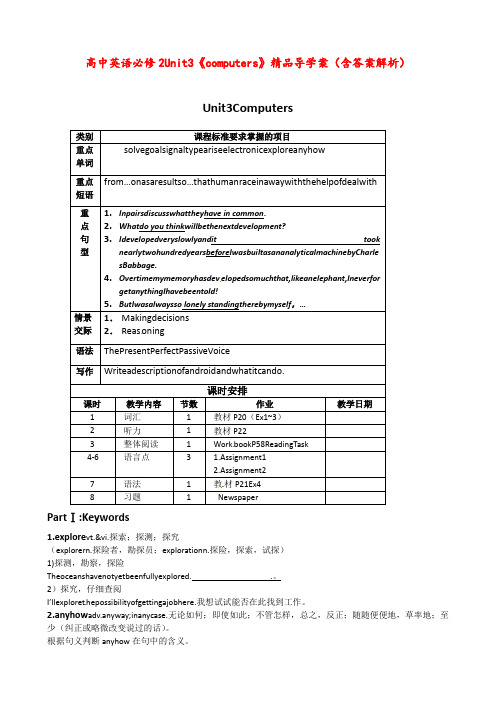
高中英语必修2Unit3《computers》精品导学案(含答案解析)Unit3Computers类别课程标准要求掌握的项目重点单词solvegoalsignaltypeariseelectronicexploreanyhow重点短语from…onasaresultso…thathumanraceinawaywiththehelpofdealwith重点句型1.Inpairsdiscusswhattheyhave in common.2.Whatdo you thinkwillbethenextdevelopment?3.Idevelopedveryslowlyandit tooknearlytwohundredyearsbeforeIwasbuiltasananalyticalmachinebyCharle sBabbage.4.Overtimemymemoryhasdev elopedsomuchthat,likeanelephant,IneverforgetanythingIhavebeentold!5.ButIwasalwaysso lonely standingtherebymyself,…情景交际1.Makingdecisions 2.Reas oning语法ThePresentPerfectPassiveVoice写作Writeadescriptionofandroidandwhatitcando.课时安排课时教学内容节数作业教学日期1 词汇 1 教材P20(Ex1~3)2 听力 1 教材P223 整体阅读 1 Work bookP58ReadingTask4-6 语言点 3 1.Assignment12.Assignment27 语法 1 教材P21Ex48 习题 1 NewspaperPartⅠ:Keywords1.explore vt.&vi.探索;探测;探究(explorern.探险者,勘探员;explorationn.探险,探索,试探)1)探测,勘察,探险Theoceanshavenotyetbeenfullyexplored. .。
高中英语必修二unit3+Computers+教案6
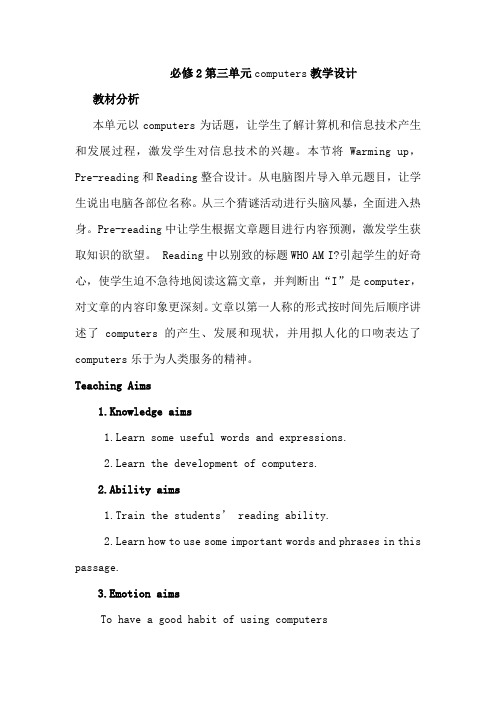
必修2第三单元computers教学设计教材分析本单元以computers为话题,让学生了解计算机和信息技术产生和发展过程,激发学生对信息技术的兴趣。
本节将Warming up,Pre-reading和Reading整合设计。
从电脑图片导入单元题目,让学生说出电脑各部位名称。
从三个猜谜活动进行头脑风暴,全面进入热身。
Pre-reading中让学生根据文章题目进行内容预测,激发学生获取知识的欲望。
Reading中以别致的标题WHO AM I?引起学生的好奇心,使学生迫不急待地阅读这篇文章,并判断出“I”是computer,对文章的内容印象更深刻。
文章以第一人称的形式按时间先后顺序讲述了computers的产生、发展和现状,并用拟人化的口吻表达了computers乐于为人类服务的精神。
Teaching Aims1.Knowledge aims1.Learn some useful words and expressions.2.Learn the development of computers.2.Ability aims1.Train the students’ reading ability.2.Learn how to use some important words and phrases in this passage.3.Emotion aimsTo have a good habit of using computersTeaching important points1.Improve reading ability and understand the passage better.2.Learn how to use some important words and phrases in this passage.Teaching proceduresⅠ. Leading-inTask1. Ask and answer:1.Do you like playing computers? How long do you spend on it each day? _____ hours .2.Can you name the parts of a computer ?【预习检测】Ⅱ.Warming up (Brainstorming:)Task 1. Guessing1. An old calculating machine used in China until now.2. It is a new calculating machine which can solve a large number of mathematical problems.3. It is a personal computer which can solve all kinds of problems and is used widely now.Task 2. Discussion: 【Group activitiy】What do they have in common?Ⅲ. Pre-readingTask 1 Discussion. How have computers changed our lives? 【Group activitiy】(What can we use computers to do in our daily life?)Task 2.Predicating: Who is the speaker in the story ?IV. While readingSkimming:Task 1.Skim the paragraphs and find out the sentences to support your predication .Task 2.Skim the passage and find out the main idea of the text.This is a short ______ of the ________of computers . Scanning:Task. Listen to the tape and find the following sentences True (T) or False (F),then tell the reasons.1.In 1642 I began as a calculating machine and could solve any mathematical problem. ( )2. My real father was Charles Babbage, who wrote a book and built me in 1936. ( )3.After I got my new transistors in the 1960s, I became smaller but cleverer and quicker . ( )4.I was brought into people’s homes in the 1970s. ( )5. Since my birth I have been built to take the place of human race. ( )V. Post-readingComprehension:【小组探究】Task1: Read the text again and find the development of the computer by the picture.Task 2: Fill in the blanks with the words in the text. (one word for each blank.)1.Although I was young I could ___________ difficult sums.2.After I was programmed by an ___________ who used cards withme.3.At that time it was considered a technological revolutionand the start of my “ artificial __________”.4.However , this __________ also worried my designers.5.As a result I ___________ changed my shape.6.Over time my memory became _____ much _____,like anelephant ,I never forget anything I have been told!VI. SummaryTask . What have we learned in this period?1.some useful phrases2.the d_______ of a computer3.some reading skillss______ , s_______VII. Assessment1.Translation【基础巩固】自我检测calculating machine ___________Analytical machine ___________card with holes ___________technological revolution ___________universal machine ___________artificial intelligence ____________go by ____________by internet ____________human race ____________2. 用括号内所给词的适当形式填空。
必修二 Unit3 Computers 教案和教学反思
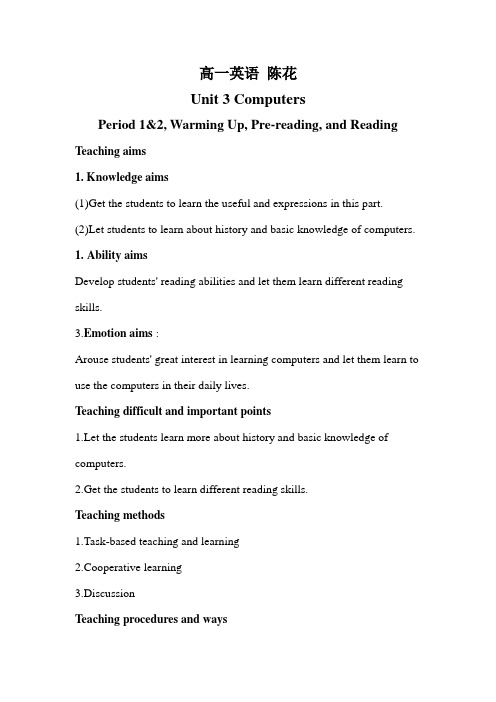
高一英语陈花Unit 3 ComputersPeriod 1&2, Warming Up, Pre-reading, and Reading Teaching aims1. Knowledge aims(1)Get the students to learn the useful and expressions in this part.(2)Let students to learn about history and basic knowledge of computers.1.Ability aimsDevelop students' reading abilities and let them learn different reading skills.3.Emotion aims :Arouse students' great interest in learning computers and let them learn to use the computers in their daily lives.Teaching difficult and important points1.Let the students learn more about history and basic knowledge of computers.2.Get the students to learn different reading skills.Teaching methods1.Task-based teaching and learning2.Cooperative learning3.DiscussionTeaching procedures and waysStep1.Warming upTask1: How much do you know about computers? (Make a survey)Task2: What is it?Give some sentences to describe different kinds of calculating objects and some pictures to help the students to guess what it is?① An old calculating machine used in China until now.An abacus② It is a new calculating machine which can solve a large number of mathematical problems.A calculator③ It is built to solve some mathematical problems. But it is too big.A huge computer④ It is a computer which can solve all kinds of problems and is usedwidely now .A PC / desktop⑤ It is a kind of computer which can be taken conveniently(方便).A laptop / notebook computerStep2.pre-readingCan you put these inventions in an order according to the time when they appeared?( ) Analytical machine(分析机)( ) Laptop( ) Calculating machine (计算机器)( ) Robot/android( ) PC( ) Universal machine(通用机器)Step3. Reading(1)SkimmingTask 1. Find out the topic sentences of each paragraph (P19.Ex2)Task 2 .Summarize the general idea of this passage.(2)ScanningTask1. True or False1.In 1642 I began as a calculating machine and could solve anymathematical problem. (F: solve any calculating problem)2.My real father was Charles Babbage, who wrote a book and buildme in 1936.(F: Alan Turning)3.After I got my new transistors in the 1960s, I became smaller butcleverer and quicker.(T)4.I was brought into people's homes in the 1970s.(T)5.Since my birth I have been built to take the place of human race.(F:build to serve human race)(3)Careful- readingTask 1: Look at the timeline below. Fill in the blanks with information from the reading text.1642: The computer began as a calculating machine1822: The Analytical Machine was made by Charles Babbage. 1936: The computer grew rapidly both in size and in brainpower. 1940s: The computers had grown as large as a room.1960s: The first family of computers was connected to each other. 1970s: Computers were used in offices and homesNow: Computers connect people all over the world together.Step4. Conclusion of the textHow did computers develop?A calculating machine →_____________→_________________→_________________→________________→___ __________→ ________________→________________→_ many new applicationsPeriod 3 Vocabulary and Useful Expressions Learning aimsGet the Ss to master some important words :common, solve, arise, signal and phrases: with the help of, as a result, in a way, deal with Objectives of process and methodCooperative learning and discussion and presentationImportant and difficult pointLearn the usage of some important words: common, solve, arise, signal. Step1. Important words1. common adj.共同的;普通的;常见的have something/much in common 有一些/很多共同之处have nothing/ little in common 没有共同之处1) They are friends, for they_________________________________________.他们是好朋友,因为他们有很多共同之处。
- 1、下载文档前请自行甄别文档内容的完整性,平台不提供额外的编辑、内容补充、找答案等附加服务。
- 2、"仅部分预览"的文档,不可在线预览部分如存在完整性等问题,可反馈申请退款(可完整预览的文档不适用该条件!)。
- 3、如文档侵犯您的权益,请联系客服反馈,我们会尽快为您处理(人工客服工作时间:9:00-18:30)。
单元知识概览学习目标:1. 知识目标:理解文章主要内容:计算机的发展演变的历史以及计算机当今的应用。
2. 能力目标:提高阅读理解能力,掌握基本的阅读技巧。
3. 情感目标:合理利用现代技术,学为所用。
学习重点:理解文章主要内容,完成相关的阅读理解学法点拨:1. 利用教材中的词汇表,词典等工具书扫除生词的障碍。
2. 使用跳读、略读等阅读技巧完成相关阅读理解题。
自主学习:1. Read the passage on page 18 Book2.2. Finish the exercise on page 28 in Step Two: Fast reading .(优化方案)3. Underline the sentences that can’t be understood.我的疑问:探究释疑:即时检测:Translate the following sentences, and pay attention to the underlined parts.1. I developed very slowly and it took nearly two hundred years before I was built as an analytical machine by Charles Babbage.2. By the 1940s I had grown as large as a room, and I wondered if I would grow any larger.3. As time went by, I was made smaller.总结反思:Period 2 Language Points in Reading Part (1)学习目标:1. 知识目标:掌握以下单词和短语的用法:solve; reality; anyhow; have …in common; from…on; as a result; asa result of ; in common with2. 能力目标:正确使用以上单词和短语。
3. 情感目标:欣赏英语语言的魅力。
学习重点:掌握以上所提及的单词和短语的用法学法点拨:利用手中的词典和优化方案等参考资料查阅重要单词和短语的用法,完成本节学习内容。
自主学习:一、阅读并完成优化方案学案二中的单词精讲和短语精释部分。
二、1. solve vt. ;solution n. ;……的解决方法a solution ____ sth.活学活用:With all the problems ________ at the meeting, the newly elected manager felt rather relaxed.A. to be solvedB. solvedC. solvingD. solving考题回顾:(2010浙江卷).The school advisers help you talk through your problems but they don't give you any direct __ . A. solution B. target C. measure D. function2. reality n. turn…into re ality __________in reality事实上,实际上。
你还学过那些短语也表示“事实上,实际上”?3. anyhow adv. ______________ anyway adv. ______________ somehow adv. ____________考题回顾:(2006湖北卷) I’m certain David’s told you his business troubles. _______ , it’s no secret that he owesa lot of money to the bank. A. However B. Anyway C. Therefore D. Though4. have… in common ________________ in common with __________ common sense _________译:和许多同学一样,数学和语文比起来他更喜欢数学。
5. from then/ now on ________________6. as a result _________ as a result of __________ result in __________ result from___________实践:ⅰHe broke his leg. _______________, he had to be away from school for two or three months.ⅱHis careless driving _____________ the accident.ⅲHe was late _______________ the snow.ⅳSickness often ____________ eating too much.7. share sth. with sb.8. provide sb. with sth./ provide sth. for sb. ________________我的疑问:探究释疑:即时检测:优化方案课时作业本学案二单项填空1-10总结反思:Period 3 Language Points in Reading Part(2)学习目标:1. 知识目标:掌握以下重要结构的用法:before…; however; as…(随着); so…that…2. 能力目标:能正确应用以上句型。
3. 情感目标:欣赏英语语言的魅力。
学习重点:掌握以上所提及重要句型的用法学法点拨:利用手中的词典和优化方案等参考资料查阅重要句型的用法,完成本节学习内容。
自主学习:一、阅读并完成优化方案学案二句型精析部分。
二、1. 教材原句I developed very slowly and it took nearly two hundred years before I was built as an analytical machine by Charles Babbage.我发展缓慢,差不多到了两百年之后,查尔斯·巴比奇才把我制成了一台分析机。
“before”在本句中的含义为“……之后才……”;引导时间状语从句。
仿写:我的老师几乎把我撞倒才看到我。
___________________________________________________思考:你还记得在必修一第一单元中我们学习过before的用法吗?你还记得其用法和含义吗?译:ⅰShe and her family hid away for nearly twenty-five months before they were discovered.ⅱ I had seen that film before we came here.ⅲ I began to talk before he could speak againⅳIt wasn’t long before he came back.总结before 常用含义:ⅰ____________ⅱ____________ⅲ__________ⅳ考题回顾:(2010福建卷)The girl had hardly rung the bell the door was opened suddenly, and her friend rushed out to greet her . A. before B. until C. as D. since(2010陕西卷)John thinks it won’t be long he is ready for his new job.A. whenB. afterC. beforeD. since2. 教材原句However, this reality also worried my designers.然而,这个现实也使我的设计者很担心。
however ①不管……如何……;无论如何(= no matter how)引导让步状语从句,其语序为:however + adj./adv. + 主语+ 谓语动词We shall never succeed, however much we try. 不管怎么努力我们都不会成功。
仿写:无论你喊多大声,你都不会被听见。
_________________________________________________②可是,然而,不过(可放在句首、句中或句末,常用逗号隔开)He said that it was so; he was mistaken, however. 他说事情就是这样,然而他错了。
活学活用:__________ hungry I am, I never seem to be able to finish off this load of bread.A. WhateverB. WheneverC. WhereverD. However3.教材原句As time went by, I was made smaller. 随着时间的推移,我被做得更小了。
(1 )句中as 引导从句,意为:句式转换:With time _______________ ,I was made smaller.(2)“go by” : 走过,经过;(时间的)过去; 按/ 依据……行事译:ⅰA car went by.ⅱTime goes by quickly on vacation.ⅲ We have to go by rules.4. 教材原句Over time my memory has developed so much that, like an elephant, I never forget anything I have been told. 经过一段时间,我的记忆力发展得如此快,就像一头大象一样,从来不会忘记告诉我的任何事情。
“so … that…”__________________此结构的用法:so + // / + that …“such… that…”此结构的用法:such + / _______________________ /_________________________ + that …请用以上任何一种结构造句:拓展:so + adj./ adv. + that 结构中,把so + adj./ adv. 提到句首时,句子要使用部分倒装结构。
